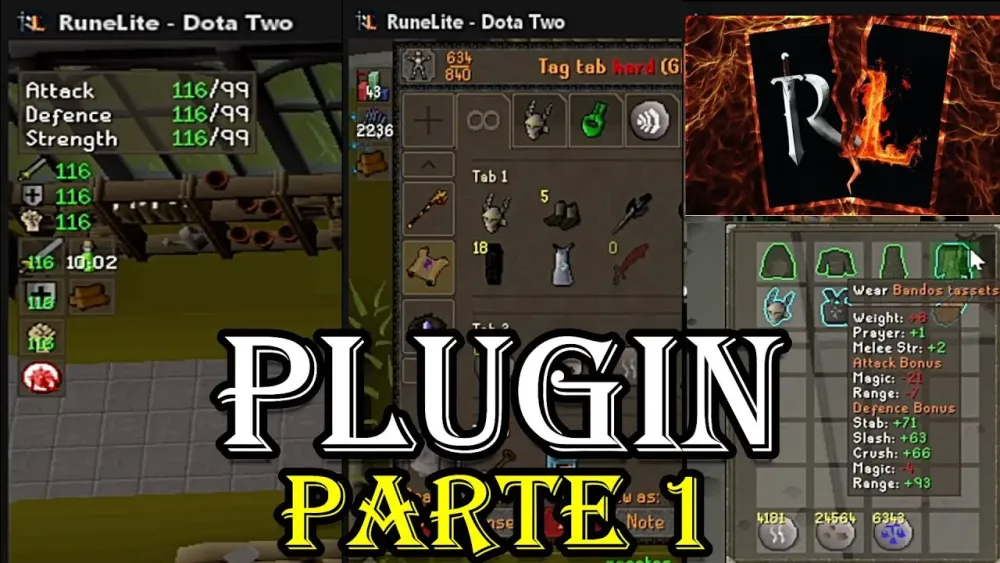Your cart is empty
Understanding OSRS RSL Plugins: What They Are and How They’re Written

OSRS RSL plugins have become essential tools for players looking to enhance their experience in Old School RuneScape (OSRS). These plugins offer various functionalities, ranging from quality-of-life improvements to advanced game mechanics, making them invaluable for both new and experienced players. Understanding what RSL plugins are and how they are created can empower players to customize their gaming experience, streamline gameplay, and gain a competitive edge.
RSL, or RuneScape Loader, is a plugin system specifically designed for Old School RuneScape. It allows developers to create additional features that can be integrated into the game client, enhancing the overall gameplay experience. RSL provides a framework for writing plugins in Java, enabling developers to interact with the game’s API, which exposes various game mechanics and data. This allows for the development of tools that can automate tasks, provide real-time data insights, and improve user interface elements.
RSL plugins can perform a wide variety of functions, such as tracking stats, managing inventory, automating repetitive tasks, and much more. They tap into the game’s data structures to offer features like boss timers, loot trackers, and skill calculators. This functionality is particularly useful in a game as vast and complex as OSRS, where players often juggle multiple activities simultaneously.
Developers interested in creating RSL plugins can start by familiarizing themselves with the OSRS API documentation, which outlines the various classes and methods available for use. The development process typically involves setting up a Java development environment, writing the plugin code, and testing it within the game client. Additionally, many community resources, forums, and GitHub repositories provide sample code and libraries to help new developers get started.
Ultimately, RSL plugins play a significant role in the OSRS community, allowing players to tailor their gameplay experience to their preferences while also contributing to the game’s dynamic ecosystem. With a growing number of developers creating innovative plugins, the potential for improving gameplay continues to expand, making it an exciting time for OSRS enthusiasts.
3. Programming Languages Used for OSRS RSL Plugins

When it comes to developing RSL plugins for Old School RuneScape (OSRS), understanding the programming languages involved is crucial. Most OSRS RSL plugins are primarily written in Java, as the game itself is built on this language. Java’s object-oriented nature allows developers to create robust and maintainable plugins. Here’s a breakdown of the key programming languages used:
- Java: The backbone of OSRS development, Java is essential for creating plugins that can seamlessly integrate with the game client.
- Python: While not directly used for OSRS plugins, Python is often employed for scripting and automation tasks that complement plugin development.
- JavaScript: Some developers use JavaScript for creating user interfaces or web-related functionalities that enhance the plugin experience.
In addition to these languages, developers often make use of various libraries and frameworks that help streamline the coding process. For instance, libraries like RSBot and OSBot provide pre-built functions that simplify plugin creation. Understanding these programming languages and tools can significantly improve your efficiency and effectiveness as a plugin developer.
4. How RSL Plugins Interact with Old School RuneScape
RSL plugins play a vital role in enhancing the gameplay experience of Old School RuneScape. They act as intermediaries that facilitate interaction between the player and the game. Here’s how RSL plugins typically interact with OSRS:
- Game Client Integration: RSL plugins operate within the OSRS game client. They hook into the game’s API, allowing them to access game data and manipulate it as needed.
- Real-Time Data Processing: These plugins can read real-time data from the game, such as player stats, inventory items, and NPC interactions. This data can then be used to provide insights or automate certain tasks.
- User Interface Enhancements: Many plugins offer additional UI elements, such as timers, alerts, and overlays, which can help players manage their gameplay more effectively.
- Automation and Scripting: Some plugins allow for automation of repetitive tasks. For example, a plugin might automatically collect resources or engage in combat, which can save players time.
Understanding how these interactions work is essential for anyone looking to develop RSL plugins. By leveraging the capabilities of these plugins, players can enhance their gameplay, streamline their activities, and ultimately enjoy a more immersive experience in Old School RuneScape.
Common Features of OSRS RSL Plugins
OSRS RSL (RuneScape Logic) plugins come with a variety of features that enhance gameplay and provide players with useful information. These plugins are designed to integrate seamlessly with the Old School RuneScape client, offering both convenience and strategic advantages. Here are some common features you can expect:
- Real-Time Tracking: Many plugins offer real-time statistics tracking, allowing players to monitor their experience gains, resource collection, and combat levels as they progress.
- Customizable Alerts: Users can set up alerts for various events, such as achieving a level-up, encountering rare drops, or completing quests. This feature keeps players engaged and informed.
- Overlay Displays: Plugins often provide overlays that display important information on-screen, such as health bars, timers, and resource counts. This helps players make quick decisions without distracting from the game.
- Automated Tasks: Some plugins allow for automation of repetitive tasks, such as skilling or combat routines. This can save time and enhance efficiency in gameplay.
- Integration with Other Tools: Many OSRS RSL plugins can integrate with external tools and websites, providing players with a comprehensive experience. This includes features like price-checking or market analysis.
Overall, these features contribute significantly to a player’s experience, making OSRS more enjoyable and less tedious. However, it’s important to use these plugins responsibly to maintain the integrity of the game.
Step-by-Step Guide to Writing Your Own RSL Plugin
Creating your own OSRS RSL plugin can be a rewarding endeavor, allowing you to tailor your gaming experience to your own preferences. Here’s a step-by-step guide to get you started:
- Set Up Your Development Environment: Begin by downloading the necessary tools like the RuneScape API and an Integrated Development Environment (IDE) such as IntelliJ IDEA or Eclipse. Ensure you have Java installed, as RSL plugins are typically written in Java.
- Understand the API: Familiarize yourself with the OSRS API documentation. Understanding the classes, methods, and functions available will help you know what you can do with your plugin.
- Plan Your Plugin: Before diving into coding, outline what features you want your plugin to have. Consider the user experience and how your plugin will interact with the game.
- Write Your Code: Start coding your plugin. Implement the core features first, and make sure to test as you go. Utilize the API to access game data and manipulate it as needed.
- Test Your Plugin: Run your plugin in a safe environment. Check for bugs, ensure that it functions as expected, and make adjustments based on your findings.
- Document Your Code: Add comments and documentation to your code. This will help others (and yourself) understand your plugin’s functionality in the future.
- Share and Iterate: Once you’re satisfied, consider sharing your plugin with the community. Gather feedback and be open to making improvements based on user input.
With patience and practice, you’ll be able to create a valuable tool that enhances your OSRS experience. Good luck and happy coding!

